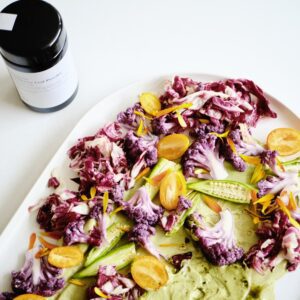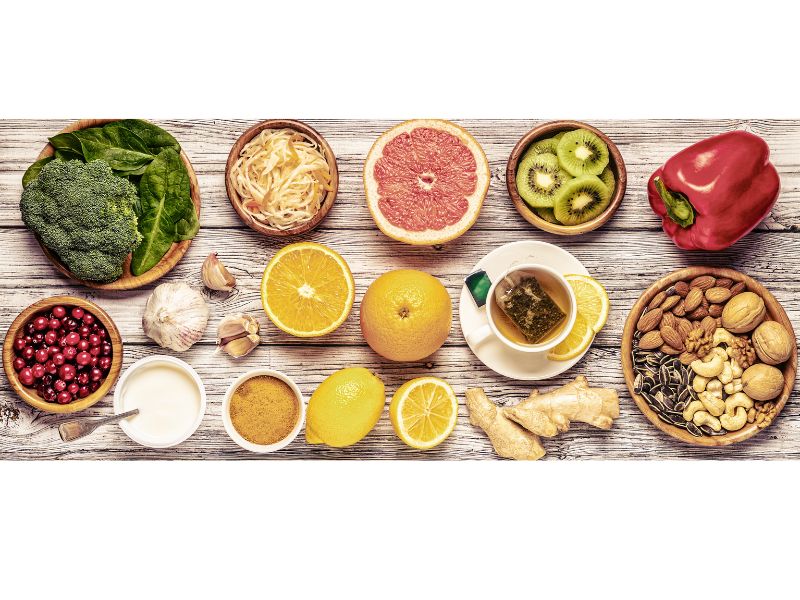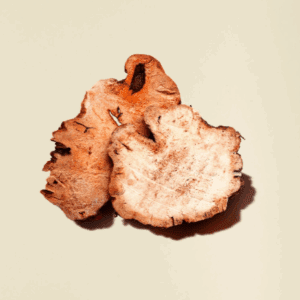
Coconut Yoghurt Cream with Mustard & Mulberry Leaf Powder
If you’re looking for a natural way to support blood

Kick-start, energise, rejuvenate
All carefully planned and prepared to help nourish, reset and rejuvenate the body and mind.

Your immune system is your body’s very own defence system against any unwanted bacteria, disease, and contaminants. Given that it plays such a pivotal role in how we feel on a daily basis, figuring out how to boost your immune system is one way you can optimise your life to its fullest potential. In this article, we’d like to introduce you to a few practical ways you can actually start doing this. Let’s find out!

A robust immune system helps protect the body against infections caused by bacteria, viruses, fungi, and parasites. It acts as the body’s first line of defence, identifying and neutralising pathogens before they can cause harm.
A strong immune system means a body that’s better equipped to respond to infections. This in turn means quicker recovery times and less severe symptoms in the off chance you do get sick.
According to Cancer Research UK, the immune system plays a critical role in identifying and destroying abnormal cells that could potentially develop into cancer. Known as immunosurveillance, this is an ongoing process where the immune system scans the body for harmful cells.
A well-regulated immune system can help manage and reduce the severity of allergic reactions. By distinguishing between harmful invaders and harmless substances, the likelihood of unnecessary immune responses are reduced.
Chronic inflammation is linked to various health problems, including heart disease, diabetes, and arthritis, as per Harvard Health Publishing. A strong immune system can help regulate inflammation, reducing the risk of chronic diseases.
A strong immune system contributes to overall energy levels and vitality. When the body is not constantly fighting off infections or dealing with chronic inflammation, you naturally feel more energetic and healthy.
As we age, the immune system weakens. Maintaining a strong immune system through healthy lifestyle choices can help slow this decline, promoting healthier ageing and reducing the risk of age-related diseases.
Looking for more information? Check out this article on Immunity Building
| Citrus Fruits (Grapefruits, Lemons, Limes) | Ginger |
| Poultry (Chicken, Pork, Turkey) | Spinach |
| Fatty Fish (Salmon, Sardines, Mackerel) | Yogurt |
| Garlic | Almonds |
| Bell Peppers | Turmeric |
| Green Tea | Papaya |
| Broccoli | Kiwi |

Want some vitamins to boost your immune system? Try out this Organic Freeze Dried Acerola
Fruits and vegetables are rich in vitamins, minerals, and antioxidants, making them the perfect foods for a healthy immune system, as per the National Library of Medicine. Having a mix of fruits and vegetables on a daily basis is one of the best ways to guarantee you’re reaping as many of their benefits as possible, all the while ensuring you never tire of any one fruit or vegetable.
Read more: Raw Food Diet: Guide, Benefits, Meal Plan, Pros & Cons
Protein-rich foods are essential for building and repairing tissues, as well as producing immune cells. Lean meats, poultry, and fatty fish are the best sources of protein, while eggs are perhaps one of the most convenient ways to get healthy protein in your body.
For those on a plant-based diet, beans, legumes, and an assortment of nuts and seeds are going to be the best options for making sure you get an adequate amount of protein.
Omega-3 fats are another necessary component of a healthy immune system. These fats are able to reduce inflammation as well as boost immune function. They can be found in a variety of fatty fish like salmon, mackerel, and sardines. However, besides that, they’re also prevalent in seeds (flax and chia), nuts (walnuts), and olive oil. Alternatively, supplements also provide the therapeutic effects needed to support an immune system, as per the National Library of Medicine.
Whole grains like oats, quinoa, and brown rice provide our body with fibre. The importance of fibre is that it supports a healthy gut microbiome, which is crucial for immune health.
Staying hydrated is often overlooked as a means of maintaining a healthy immune system, and the repercussions of that are severe. Drinking plenty of water and consuming hydrating foods like cucumbers, watermelon, and citrus fruits are among the best ways in which you can support your overall health, not just the health of your immune system.
Check out this Immunity Alchemy Tonic Supplement for an even healthier immune system!
According to Cleveland Clinic, Vitamin C is a potent antioxidant that helps protect cells from damage.
Vitamin C also aids in the production of collagen, which is important for skin health and wound healing.
Vitamin C supports the production and function of white blood cells, which are essential for fighting infections.
→ Sources of Vitamin C include your favourite citrus fruits, berries, bell peppers, kiwi, and spinach.
Vitamin D is crucial for the activation of immune cells, so much so that Vitamin D receptors are present on almost all immune cells, according to the National Library of Medicine.
Vitamin D helps modulate the immune response, thereby reducing the risk of chronic inflammation.
Adequate levels of vitamin D enhance the body’s ability to fend off respiratory infections.
→ Sources of Vitamin D include exposure to sunlight, fatty fish, egg yolks, and mushrooms.
Vitamin E is a powerful antioxidant, as per the Mayo Clinic.
Vitamin E also enhances the function of immune cells, particularly T cells. These play a critical role in immune responses.
Vitamin E helps in regulating and balancing the immune response, preventing excessive inflammation.
→ Sources of Vitamin E include nuts, seeds, spinach, broccoli, and vegetable oils.
Read more: Micro nutrients
Zinc is essential for the development and function of immune cells, to the extent that Zinc-deficiency have severe immune dysfunctions, as per the National Library of Medicine.
Zinc alco plays a role in the function of various enzymes that are important for immune responses.
Zinc aids in wound healing and skin health, serving as a first line of defence against pathogens.
→ Sources of Zinc include meat, shellfish, beans, whole grains, and dairy.
Looking for more immune-boosting products? Check out this Organic Amla supplement
Regular physical activity improves circulation, allowing immune cells to move more efficiently throughout the body.
Exercise helps reduce chronic inflammation, which can weaken the immune system.
Physical activity promotes the release of endorphins, which reduce stress levels and support immune function.
→ According to Harvard Health Publishing, regular exercise is one of the pillars of a healthy immune system. Make sure to include a mix of cardiovascular, strength training, and flexibility exercises. Popular examples include walking, running, cycling, swimming, yoga, and weightlifting.
Sleep is essential for the repair and regeneration of immune cells.
Adequate sleep helps regulate hormones that are vital for immune function, such as melatonin and cortisol.
During sleep, the body produces cytokines. These are proteins that help fight infection and inflammation.
→ According to Canadian Science Publishing, sleep durations between 7-8 hours per night are most associated with health. Furthermore, it’s important to establish a consistent sleep schedule by going to bed and waking up at the same time every day. You can do this by creating a relaxing bedtime routine and a comfortable sleep environment.
Staying hydrated helps flush toxins from the body, which can otherwise burden the immune system.
Water is essential for the optimal functioning of all cells, including immune cells.
Proper hydration maintains the health of mucous membranes in the respiratory and digestive systems, which act as barriers to pathogens.
→ According to Harvard Health Publishing, recommended amounts of water intake per day are15.5 cups for men and 11.5 cups for women. This should increase if you are physically active or in hotter climates. To help with hydration, include hydrating foods in your diet like cucumbers, watermelon, and citrus fruits. It’s also important to limit the consumption of dehydrating beverages like alcohol and caffeine.
Read more: Everything about cellular detox.
Chronic stress increases cortisol levels, which can suppress immune function.
Managing stress promotes relaxation and reduces inflammation.
Effective stress management supports the activity of immune cells.
→ Recommendations for stress management are to practise mindfulness techniques like meditation, deep breathing, or yoga. It’s also important to balance work with hobbies and activities you enjoy and find relaxing. Furthermore, you should maintain social connections and seek support from friends, family, or professionals when needed.
Excessive sugar intake can cause chronic inflammation, which weakens the immune system.
High sugar consumption can also negatively affect the gut microbiome, which is crucial for immune function.
Reducing sugar intake helps maintain stable energy levels, preventing the immune-suppressing effects of blood sugar spikes and crashes.
→ According to Very Well Health, the recommended daily sugar intake should be capped at about 25 grams, or 6 teaspoons. It’s important to read food labels to identify and reduce hidden sugars in processed foods and opt for choices like astragalus, graviola, acerola, and amla instead.
Check out this Raw Organic Graviola Powder for an antibacterial, antiviral, and antiparasitic supplement!
At Shoku Iku, we pride ourselves on several products that boost immunity. From astragalus to various types of medicinal mushrooms, these herbal supplements are a great way to start bolstering your immune system.
Reference:

If you’re looking for a natural way to support blood

Despite growing threats to our well-being, the human longing for

There are herbs and mushrooms that make waves in the
Copyright Shoku Iku © 2024 | All Rights Reserved.
The statements on this website have not been evaluated by the TGA or FDA. These products are not intended to diagnose, treat, cure or prevent any disease.
Sign up to receive your discount.